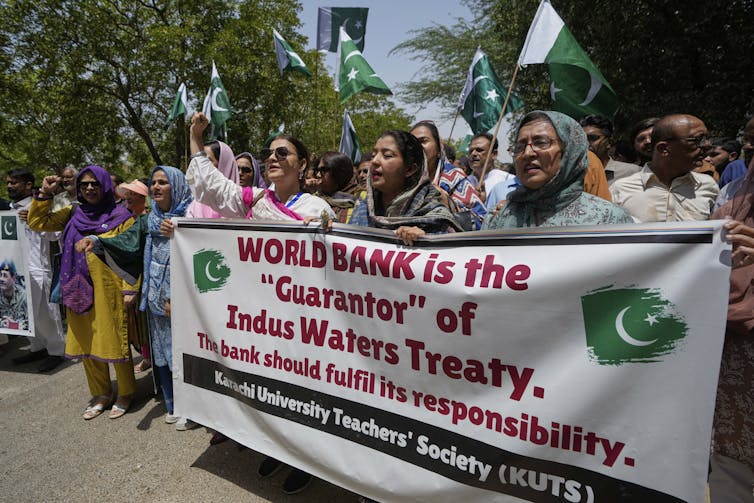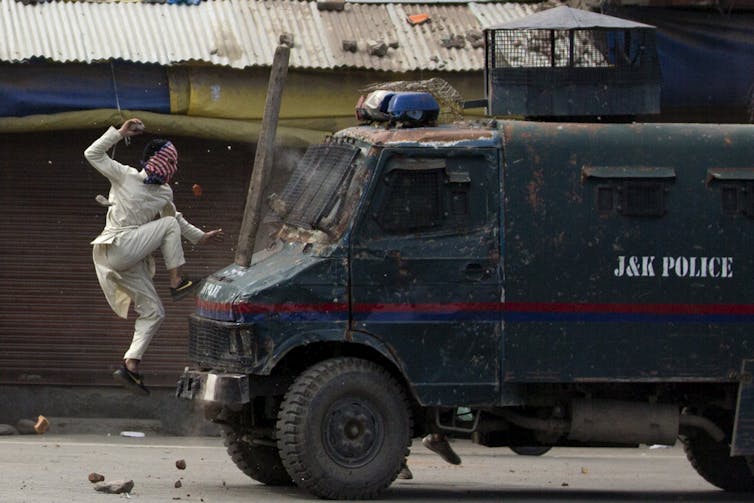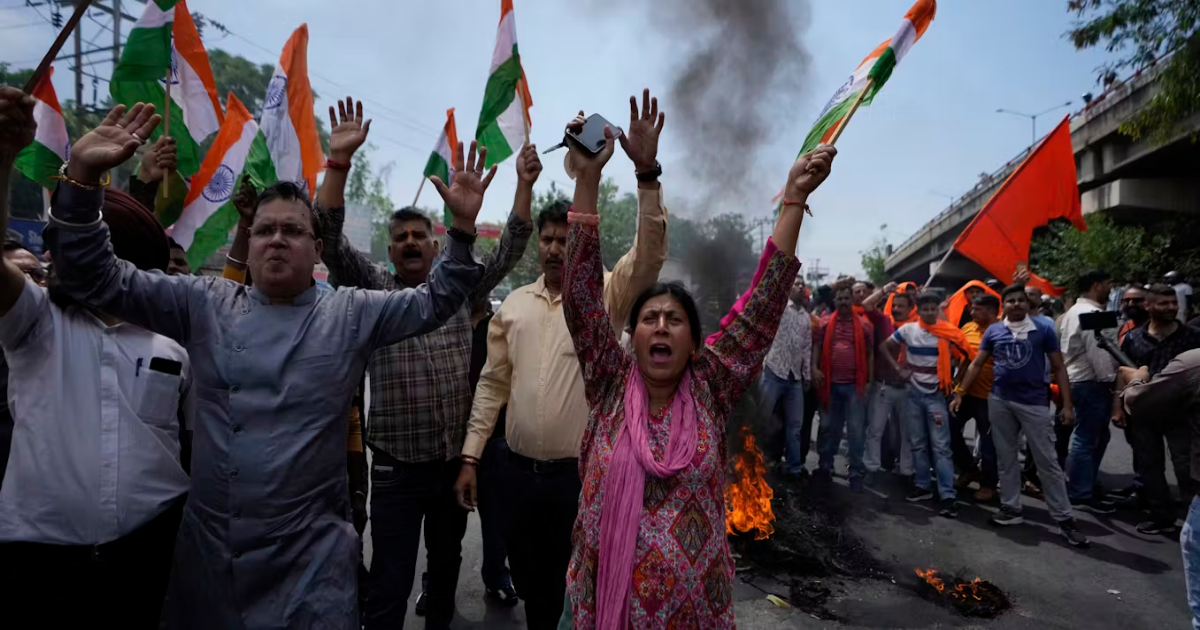India and Pakistan are once again at a standoff over Kashmir. A terror attack last week in the disputed region that killed 26 tourists – mostly Indian – has brought the two nuclear-armed South Asian rivals close to a devastating conflict.
India claims the incident was an act of cross-border terrorism supported by Pakistan and has vowed to hunt down and punish the perpetrators. In retaliation, it has suspended the Indus Waters Treaty to deprive Pakistan of water from the Indus River, which runs through the Indian-controlled region of Jammu and Kashmir.

Teachers in Pakistan protest India’s decision to suspend the Indus Waters Treaty. Shahzaib Akber/EPA
Pakistan has condemned India’s action as an “act of war”.
Both sides have put their forces on alert as low-level clashes have broken out along the “Line of Control”, the de facto border established in the region following the first Indo-Pakistan war in 1947–48.
Pakistan’s defence minister now says a “military incursion” by India is imminent. Can all-out war between the two sides be averted?
A long-simmering dispute
At the time of the painful partition of British India in the 1940s, the country’s Muslim minority were given the option of joining the newly created state of Pakistan. Kashmir’s Hindu ruler initially wanted independence for the region, but in fear of invaders from Pakistan, decided to join India.
This laid the foundations for an enduring, bitter dispute over control of the Muslim-majority region. Attempts at a resolution have been hard to come by.
The dispute has also become intrinsically linked to the political and strategic postures of the two protagonists.
New Delhi has vehemently opposed any nationalist demands for independence in Jammu and Kashmir. It fears this would set a precedent for many other minorities who want autonomy in multi-ethnic India.
Initially, the region was given a special autonomous status under Article 370 of the Indian constitution. But since 2014, the ruling Hindu nationalist Bharatiya Janata Party (BJP) under Prime Minister Narendra Modi has forcefully sought to bring Jammu and Kashmir under New Delhi’s control.
In 2019, it revoked Article 370 and isolated the region from the rest of India and the outside world.
Modi’s government argued this was necessary to bring progress and prosperity to the people of Jammu and Kashmir. In reality, it was aimed at squashing separatist movements and easing the way for more Hindus to move to the territory.

A masked Kashmiri protester jumps on the bonnet of an armoured Indian police vehicle during a protest in 2019. Dar Yasin/AP
Pakistan condemned the scrapping of Article 370, exacerbating the tensions between the two regional powers.
New Delhi has also accused Pakistan of involvement in cross-border terrorist acts over the years. Islamabad has refuted New Delhi’s claims and castigated it for human rights violations in Jammu and Kashmir and for denying the people their right to self-determination.
Nuclear deterrence has been effective
India and Pakistan fought two wars in 1965 and 1971, the latter resulting in the dismemberment of Pakistan and creation of the state of Bangladesh.
In 1999, the two rivals came very close to a nuclear exchange in the limited Kargil War in Kashmir, but pulled back from the brink. As I wrote at the time, the consequences of a nuclear war played a crucial role in both sides eventually backing down.
This is also the main reason the protagonists have not fought another all-out war in five decades, notwithstanding periodic clashes along the Line of Control and the Kargil conflict. And nuclear deterrence may once more prove effective in preventing the two sides from escalating the current conflict.
Pakistan is also going through a very politically, economically and socially fragile period in its history.
The country has been in political turmoil since the ousting and arrest of popular Prime Minister Imran Khan in 2023. The economy is in the doldrums. And the government faces a renewed threat from the Pakistani Taliban, amid growing tensions between Pakistan and Afghanistan.

Police officers fire rubber bullets to disperse supporters of Imran Khan’s party during clashes in Islamabad last year. Irtisham Ahmed/AP
The main force holding Pakistan together is the military and the powerful Inter-Services Intelligence (ISI) agency.
India is facing its own challenges, despite being in a more stable position. The Modi government’s Hindu nationalism has marginalised minority groups, in particular the country’s Muslim population. And income inequality is growing, with the richest 1% of the country holding 58% of the wealth.
Neither country can afford a war right now – particularly one with potentially catastrophic consequences.
